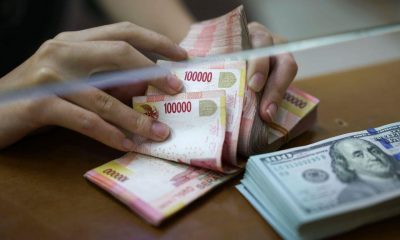Economy
Forex No Deposit Bonus 2023

Diving into forex trading can be daunting, with many novices facing substantial losses due to inexperience and lack of strategy. Yet, hope isn’t lost as several brokers offer innovative solutions to mitigate these risks.
Traders Union demystifies one solution that’s gaining traction: the Forex no-deposit bonus. Covering the intricacies of the Forex no-deposit bonus 2023, they offer insight into its potential benefits. They elucidate on how it can provide traders with free start-up funds, transforming the forex trading experience.
What is a Forex no-deposit bonus?
Traders Union helps illuminate the concept of a Forex no-deposit bonus, a valuable tool for both novice and veteran traders. This type of bonus:
- Is an incentive offered by brokers to new customers upon opening an account.
- Constitutes a certain amount of money credited by the broker that can be used for trading, thereby reducing risk for the trader.
- Provides a way for traders to get acquainted with the market without worrying about capital loss.
- Is considered by some as an effective means to profit, while others see it as a launching pad for long-term investment.
- Serves as a motivator to become active in the forex market, with some brokers only transferring profits earned with bonus funds after certain conditions are met.
- Is often used by veteran traders to test a new broker’s platform, software, trading instruments, and conditions while preserving their own funds.
No-deposit bonuses without verification: Pros and cons
TU experts highlight the various types of no-deposit bonuses without verification, each with its own set of pros and cons:
Withdrawable bonuses
- Pro: The profit and the bonus itself can be withdrawn.
- Con: The bonus is typically small, verification may still be required for withdrawal, and additional conditions may apply.
Non-withdrawable bonuses
- Pro: The bonus is usually larger, and there are no restrictions on its usage.
- Con: The bonus itself cannot be withdrawn, but the profits gained using it can be.
Bonuses requiring winning back in lots
- Pro: The bonus is substantial, encouraging larger bets.
- Con: Funds cannot be withdrawn until a certain number of lots are traded.
Time-limited bonuses
- Pro: The bonus is substantial and encourages larger bets, making it perfect for active traders.
- Con: Not suitable for low-activity traders as the bonus is retracted after a while.
Bonuses with a merit value limit
- Pro: Allows novice traders to practice with real funds and make some money.
- Con: Limited potential winnings, the bonus ceases to apply after reaching a certain limit.
Asset-restricted bonuses
- Pro: The bonus is substantial, allowing for larger bets.
- Con: The bonus applies only to certain trading instruments.
Bonuses requiring subsequent replenishment
- Pro: There are usually no limits on rates, and the bonus is substantial.
- Con: After reaching certain limits, the account must be replenished to continue using the bonus and/or the won funds.
Top brokers with bonuses
TU analysts have identified the top brokers providing lucrative bonus offerings, elevating the trading experience for their clients.
- RoboForex: RoboForex offers competitive bonuses, enhancing the trading journey with its user-friendly platform and innovative technology.
- InstaForex: Known for generous bonuses, InstaForex excels with its reliable services and diverse range of tradable assets.
- Tickmill: Tickmill stands out with enticing bonus offers, backed by its solid execution speed and transparent pricing.
- Admiral Markets: Admiral Markets boasts a range of bonuses, coupled with advanced trading tools and excellent customer service.
- FBS: FBS offers attractive bonuses, supported by its wide array of trading instruments and user-centric platform.
As Traders Union continues to explore the Forex landscape, it aims to publish regular updates on these top brokers. The objective is to keep traders informed about evolving bonus schemes, allowing them to make the most of their trading experience.
Conclusion
In conclusion, Forex no-deposit bonuses can offer significant advantages for traders, from reducing risk to providing essential practice. Understanding the terms and selecting a reliable broker are crucial steps in this process. As Traders Union continues to publish updated insights, traders can navigate the Forex market with greater confidence. For more info, visit the Traders Union website.
Economy
Nigeria’s Economy Expands 4.07% in Q4 2025

By Adedapo Adesanya
Nigeria’s economy, measured by gross domestic product (GDP), grew by 4.07 per cent (year-on-year) in real terms in the fourth quarter (Q4) of 2025.
The National Bureau of Statistics (NBS) announced the development in its latest GDP report for Q4 2025 on Friday.
The latest figure represents an improvement over the 3.76 per cent growth recorded in the corresponding period of 2024, signalling sustained recovery across key sectors of the economy. The growth rate was faster than the third quarter’s 3.98 per cent.
The report confirmed that Nigeria’s oil sector grew 6.79 per cent year-on-year and the non-oil part of the economy expanded by 3.99 per cent.
Nigeria’s average daily oil production stood at 1.58 million barrels per day in the final three months of 2025. That was lower than the third quarter’s output of 1.64 million barrels per day but higher than the 1.54 million barrels per day in the fourth quarter of 2024.
Breakdown of the data showed that the agriculture sector grew by 4.00 per cent in the fourth quarter of 2025. This marks a significant increase compared to the 2.54 per cent growth recorded in the same quarter of 2024, reflecting improved output and resilience in the sector.
The industry sector also recorded a stronger performance during the period under review. It grew by 3.88 per cent year-on-year, up from 2.49 per cent posted in the fourth quarter of 2024. The improvement suggests enhanced activity in manufacturing, construction, and related industrial sub-sectors.
The services sector maintained its position as a major growth driver, expanding by 4.15 per cent in Q4 2025. However, this was slightly lower than the 4.75 per cent growth recorded in the corresponding quarter of the previous year.
Overall, the 4.07 per cent GDP growth in the final quarter of 2025 underscores broad-based expansion across agriculture, industry, and services, despite a marginal moderation in services growth.
The Q4 performance provides further evidence of strengthening economic momentum, with improvements recorded in both agriculture and industry compared to the previous year.
Economy
Flour Mills Supports 2026 Paris International Agricultural Show

By Modupe Gbadeyanka
For the second time, Flour Mills of Nigeria Plc is sponsoring the Paris International Agricultural Show (PIAS) as part of its strategies to fortify its ties with France.
The 2026 PIAS kicked off on February 21 and will end on March 1, with about 607,503 visitors, nearly 4,000 animals, and over 1,000 exhibitors in attendance last year, and this year’s programme has already shown signs of being bigger and better.
The theme for this year’s event is Generations Solution. It is to foster knowledge transfer from younger generations and structure processes through which knowledge can be harnessed to drive technological advancement within the global agricultural sector.
In his address on the inaugural day of the Nigerian Pavilion on February 23, the Managing Director for FMN Agro and Director of Strategic Engagement/Stakeholder Relations, Mr Sadiq Usman, said, “At FMN, our mission is Feeding and Enriching Lives Every Day.
“This is a mandate we have fulfilled through decades of economic shifts, rooted in a culture of deep resilience and constant innovation. We support this pavilion because FMN recognises that the next frontier of global Agribusiness lies in high-level technical exchange.
“We thank the France-Nigeria Business Council (FNBC), the organisers of the PIAS, and our fellow members of the Nigerian Pavilion – Dangote, BUA, Zenith, Access, and our partners at Creativo El Matador and Soilless Farm Lab— we are exceedingly pleased to work to showcase the true face of Nigerian commerce.”
Speaking on the invaluable nature of the relationship between Nigeria and France, and the FMN’s commitment to process and product innovation, Mr John G. Coumantaros, stated, “The France – Nigeria relationship is a valuable partnership built on a shared value agenda that fosters remarkable Intercontinental trade growth.
“Also, as an organisation with over six decades of transformational footprint in Nigeria and progressively across the African Continent, FMN has been unwaveringly committed to product and process innovation.
“Therefore, our continuous partnership with France for the success of the Paris International Agricultural Show further buttresses the thriving relationship between both countries.”
PIAS is one of the most widely attended agricultural shows, with thousands of people from across the world in attendance.
Economy
NEITI Backs Tinubu’s Executive Order 9 on Oil Revenue Remittances

By Adedapo Adesanya
Despite reservations from some quarters, the Nigeria Extractive Industries Transparency Initiative (NEITI) has praised President Bola Tinubu’s Executive Order 9, which mandates direct remittances of all government revenues from tax oil, profit oil, profit gas, and royalty oil under Production Sharing Contracts, profit sharing, and risk service contracts straight to the Federation Account.
Issued on February 13, 2026, the order aims to safeguard oil and gas revenues, curb wasteful spending, and eliminate leakages by requiring operators to pay all entitlements directly into the federation account.
NEITI executive secretary, Musa Sarkin Adar, called it “a bold step in ongoing fiscal reforms to improve financial transparency, strengthen accountability, and mobilise resources for citizens’ development,” noting that the directive aligns with Section 162 of Nigeria’s Constitution.
He noted that for 20 years, NEITI has pushed for all government revenues to flow into the Federation Account transparently, calling the move a win.
For instance, in its 2017 report titled Unremitted Funds, Economic Recovery and Oil Sector Reform, NEITI revealed that over $20 billion in due remittances had not reached the government, fueling fiscal woes and prompting high-level reforms.
Mr Adar described the order as a key milestone in Nigeria’s EITI implementation and urged amendments to align it with these reforms.
He affirmed NEITI’s role in the Petroleum Industry Act (PIA) and pledged close collaboration with stakeholders, anti-corruption bodies, and partners to sustain transparent management of Nigeria’s mineral resources.
Meanwhile, others like the Petroleum and Natural Gas Senior Staff Association of Nigeria (PENGASSAN) have kicked against the order, saying it poses a serious threat to the stability of the oil and gas industry, calling it a “direct attack” on the PIA.
Speaking at the union’s National Executive Council (NEC) meeting in Abuja on Tuesday, PENGASSAN President, Mr Festus Osifo, said provisions of the order, particularly the directive to remit 30 per cent of profit oil from Production Sharing Contracts (PSCs) directly to the Federation Account, could destabilise operations at the Nigerian National Petroleum Company (NNPC) Limited.
Mr Osifo firmly dispelled rumours of imminent protests by the union, despite widespread claims that the controversial executive order threatens the livelihoods of 10,000 senior staff workers at NNPC.
He noted, however, that the union had begun engagements with government officials, including the Presidential Implementation Committee, and expressed optimism that common ground would be reached.
Mr Osifo, who also serves as President of the Trade Union Congress (TUC), expressed concerns that diverting the 30 per cent profit oil allocation to the Federation Account Allocation Committee (FAAC), without clearly defining how the statutory management fee would be refunded to NNPC, could affect the salaries of hundreds of PENGASSAN members.
-

 Feature/OPED6 years ago
Feature/OPED6 years agoDavos was Different this year
-
Travel/Tourism10 years ago
Lagos Seals Western Lodge Hotel In Ikorodu
-

 Showbiz3 years ago
Showbiz3 years agoEstranged Lover Releases Videos of Empress Njamah Bathing
-

 Banking8 years ago
Banking8 years agoSort Codes of GTBank Branches in Nigeria
-

 Economy3 years ago
Economy3 years agoSubsidy Removal: CNG at N130 Per Litre Cheaper Than Petrol—IPMAN
-

 Banking3 years ago
Banking3 years agoSort Codes of UBA Branches in Nigeria
-

 Banking3 years ago
Banking3 years agoFirst Bank Announces Planned Downtime
-

 Sports3 years ago
Sports3 years agoHighest Paid Nigerian Footballer – How Much Do Nigerian Footballers Earn




















